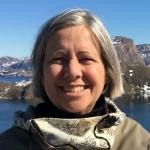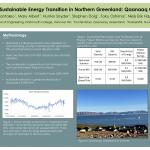Innovations in Energy Technologies and Empowerment in Arctic Fishing Communities (aka Qulleq)
Cold Arctic conditions, twenty-four-hour summer sunlight combined with twenty-four-hour winter darkness, and changing coastal conditions are threatening survival of Arctic communities. Many communities currently rely entirely on expensive fossil fuels for their energy needs. The joint impacts of energy cost, changes in fisheries and the environment, and a young self-rule national government are intertwined in ways that are currently threatening the culture and lifestyles of people in Northern Greenland who have long called the region home. This project discovers sustainable technological innovations and identifies an achievable and affordable pathway to the future for small communities in Northern Greenland in a changing Arctic. The research goals involve solving stakeholder-driven linked engineering-fisheries-policy challenges in ways that empower people and build capacity for an affordable, sustainable future. The discoveries will be published so that the findings will be widely available. Educational activities with the youth and schools in Greenland will provide inquiry-based, hands-on activities for learning about renewable energy systems that are also useful in schools in the U.S. and elsewhere. The learning activities will contribute to self-confidence needed by students to pursue technology-oriented careers. Sustainable technological solutions will also benefit remote communities in the mid-latitudes. Availability of affordable renewable energy will enable cultural continuity, enhance health and safety, and strengthen community resilience.
An iterative, systems-based approach that is driven by stakeholder values and objectives with co-produced knowledge is being used to define energy and fishery-related research needs faced by Arctic communities who rely on fishing for their food and income. Initiated by an invitation from local fishers in Qaanaaq, Greenland to a Dartmouth professor, this project represents stakeholder-driven science with knowledge co-generation between community members and academics. Research by faculty, graduate and undergraduate students in this project will produce mission-relevant insights and prototypes and will enable identification of robust and resilient adaptation strategies. Engineers, scientists, students, hunter-fishers, utility managers, local government representatives, and citizens will collaborate to address challenging interdisciplinary problems in this region where planning and adaptation to environmental change is not already in place. Issues of adaptation will be pursued in ways that embrace energy self-reliance, identify an achievable and sustainable pathway to a resilient future, and contribute to convergent capacity-building for engineering in changing conditions.
The project will identify, design, test, and demonstrate cutting-edge and next-generation energy technology systems designed for polar conditions and will identify affordable pathways for implementation that embraces the cultural heritage and strengthens the local energy independence of the people of Greenland. There will be four field seasons based in Qaanaaq 2022 to 2025 (original plans to start in 2020 were deferred due to COVID-19). In each year, for two approximately two-week visits, the majority of team members will fly directly from the US to Thule Air Base (AB), while Greenlandic colleagues, if joining, will arrive in Thule AB via Air Greenland from Nuuk. In May, July, and August 2022, five to eight US team members will travel to Thule AB via Air Mobility Command (AMC) and then onward to Qaanaaq on Air Greenland. In Qaanaaq the team will: (1) meet with community members to discuss needs and to plan solutions, install data loggers to collect thermal data, and identify primary uses of electrical power; (2) conduct energy studies of residential buildings using blower door tests, thermography, and visual inspections; (3) survey current uses of energy for transportation; (4) determine uses of energy for fish processing, evaluate energy storage considerations, and lead hands-on STEM activities with community youth. In August, four team members will travel to Siorapaluk. In February and August 2023, three to six US team members will travel to Thule AB via AMC and then onward to Qaanaaq on Air Greenland. During the August trip the six team participants will travel to Siorapaluk via Air Greenland and to Qeqertat via boat transfer. In Qaanaaq the team will: (1) meet with community members to discuss possibilities for inclusion of solar energy, discuss co-generated draft designs of affordable, energy efficient small homes for fishers, and foster education activities for renewable energy science and engineering; (2) hold a workshop with fishers to co-generate plans for local fishing regulations, explore and discuss small-scale fishery development opportunities, and discuss potential engineering solutions for their fish drying hut challenges; (3) visit Siorapaluk in August to assess and discuss wind data, install a household-scale wind generator, and engage in community discussions relevant to this research; (4) visit Qeqertat in August to assess readiness for solar installation, gather data on electricity generation and use, and engage in community discussions relevant to this research.
Battelle ARO will provide Thule AB clearances, Air National Guard coordination for cargo, Air Mobility Command coordination for passengers, NSF truck at Thule, lodging in Thule, medical kit and satellite phone, travel and freight between Thule and Qaanaaq for all US field party members, travel to villages of Qeqertat and Siorapaluk for all field party members, and field safety training. All other logistics will be arranged and paid for by the PI from the research grant.
Resources
Modeling a Sustainable Energy Transition in Northern Greenland: Qaanaaq Case Study
Many remote subsistence communities in the high Arctic rely solely on fossil fuels for heat and electricity. In Greenland, the government has reduced support for subsistence communities that receive significant fuel subsidies. In order to help enable a pathway for subsistence communities in northwest Greenland to continue their right to self determination, the feasibility of cost saving energy system improvements via renewable energy is explored.
Research Collaborator(s)
Publications
Project Outcomes
In the already extreme conditions of the high Arctic, changing environmental conditions, limited economic opportunities, and changing governmental policy decisions challenge the survival of small Arctic communities. For this convergence research project, community members in Northern Greenland and academics at Dartmouth collaborated to identify, create, and test next-generation systems designed to embrace cultural heritage while increasing self-reliance in the transition to renewable energy.
This research produced discoveries in a number of areas. At the local utility scale, unit commitment optimization modeling of the power grid was carried out using local environmental conditions in Qaanaaq, Greenland, a northern community without wind or hydro potential. These showed that solar and battery electric storage would lower the need for imported fossil fuels and contribute to decreased costs to generate electricity. This result encourages the utility company to include solar energy and battery storage along with the production of power through diesel as the lowest cost and highest reliability alternative. Green hydrogen production was evaluated as well. Though it is not currently feasible, this technology may have positive impacts as a long-term energy planning strategy. At the neighborhood scale, generation of electricity through solar could eliminate the need for imported fossil fuels for five months per year. At the household scale, co-production of knowledge led to the design of an affordable, energy efficient house that will reduce dependence on fossil fuel while providing a safe, healthy, comfortable home for couples and small families. Research results also investigated the primary income source for the community - fishing. These studies indicated that for policy decisions regarding fishing quotas, fishers and fishery policy decision makers must increase the exchange of technical knowledge in understandable terms in order for the Greenland fisheries policy to achieve sustainability outcomes and to secure livelihoods for small-scale fisheries. In order to augment family food supply and increase fisher family income at a given stock take level, a co-designed offgrid solar-powered fish drying box technology was developed to enable individual local fishers to increase the value of their catch through entrepreneurial processing and drying of fillets that they can sell in regional markets. With respect to fundamental battery technology development, new liquid sulfur-based cathode materials were synthesized and investigated. The highly reversible all-liquid electrochemical conversion addressed many major issues in low-cost lithium-sulfur batteries (such as sluggish redox kinetics and volume expansion), and enabled the lithium-sulfur batteries to deliver high capacity and excellent cycling stability at wide operating temperatures down to −60 C.
The broader impacts of this research empower individuals and small communities in the high Arctic to lessen their reliance on imported fossil fuels, understand how to implement and use solar energy at the individual and household scale, and enable individual fishers-entrepreneurs to increase the take home value of their catch. Collectively these technologies increase economic viability of small rural Arctic settlements by decreasing the need for monetary outlays (for fuel) and increasing net income (for fish). The improvement in net balance increases settlement autonomy and reduces reliance on government subsidy. The technologies and economic principles developed in this project are useful in other regions beyond the Arctic, particularly rural small communities. In addition, this project supported research projects for three PhD students and three Masters students at the Thayer School of Engineering at Dartmouth College. Further analysis and writing are in progress.





